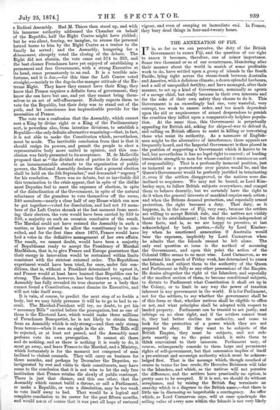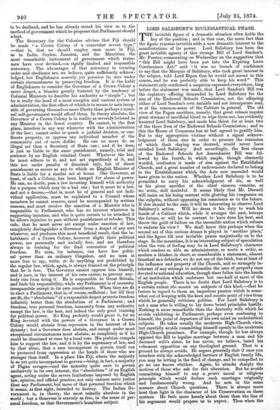THE ANNEXATION OF FIJI.
IT is, so far as we can perceive, the duty of the British Government to annex Fiji, and the question of our right to annex it becomes, therefore, one of minor importance. Some two thousand or so of our countrymen, blundering after their manner about the world in search of some profitable work to do, have settled upon a group of islands in the South Pacific, lying right across the steam-track between Australia and America, with a delicious climate, a dozen splendid harbours, and a soil of unequalled fertility, and have managed, after their manner, to set up a kind of Government, nominally as agents of a savage chief, but really because in their own interests and for the sake of their own safety they choose to do it. This Government is an exceedingly bad one, very wasteful, very corrupt, too weak to ensure order, and too much dependent upon the aid or acquiescence of armed desperadoes to punish the cruelties they inflict upon a comparatively helpless popula- tion. At the same time, this Government is perpetually appealing for British aid, asking for ships-of-war to defend it, and calling on British officers to assist in killing or terrorising those who resist its authority. As a massacre of English- men might be the alternative of interference, those appeals are frequently heard, and the Imperial Government is thus placed in the position of supporting a Government which it knows to be bad, but nevertheless it has no legal right to control ; of lending irresistible strength to men for whose conduct it assumes no sort of responsibility. That is a profoundly immoral position, just as immoral as a protectorate over pirates would be, and the Queen's Government would be perfectly justified in terminating it, even if the settlers disapproved, or the natives were dis- inclined to acquiesce. We may not be bound, as Lord Kim- berley says, to follow British subjects everywhere, and compel them to behave decently, but we certainly have the right to do it when the general interests of mankind require each action ; and when the Britons demand protection, and especially armed protection, the right becomes a duty. That duty, as it happens, is, in the case of Fiji, very easy, because the settlers are willing to accept British rule, and the natives not visibly hostile to its establishment ; but the duty exists independent of those facts, and is, as we are happy to perceive, at last acknowledged by both parties,—fully by Lord Kimber- ley when he sanctioned annexation if Australia would bear the expenses, implicitly by Lord Carnarvon when he admits that the Islands cannot be left alone. The only real question at issue is the method of assuming the Government, and upon this point the action of the Colonial Office seems to us most wise. Lord Carnarvon, as we understand his speech of Friday week, has determined to annex the Islands, and subject them to the authority of the Queen and Parliament as fully as any other possessions of the Empire. He denies altogether the right of the Islanders, and especially of the smallest section of them, to become conditional subjects, to dictate to Parliament what Constitution it shall set up in the Colony, or to limit in any way the power of taxation inherent in any government in the world. It is for Parliament, not for the settlers, to say whether the government shall be of this form or that, whether natives shall be eligible to office or not, and what principles shall be adopted with respect to landed property. Parliament can be trusted to act justly, and infringe on no clear right, and if the settlers cannot trust it, they had better decline its authority, and cease to look for the protection of a power which they are not prepared to obey. If they want to be subjects of the British Empire, they must be subjects, and not sub- jects exactly up to the point which it suits them to think convenient to their interests. Parliament may, of coarse, subsequently concede to them large and permanent rights of self-government, but that concession implies of itself a pre-existent and sovereign authority which must be aclmow- lodged first. That is the message which, though couched of course in terms far less crude, Sir Hercules Robinson will take
to the Islanders, and which, as the natives will not perceive the difference, and the settlers have practically no option, is pretty sure to be accepted. If it is not, we should do without acceptance, and by raising the British flag terminate an anarchy which is a disgrace to the British name,—but there is little use in discussing so improbable a contingency. An offer which, as Lord Carnarvon says, will at once quadruple the selling value of every acre within the Islands is not very likely to be declined, and he has already stated his view as to the method of government which he proposes that Parliament should
and not a decree,—that is, must be of general and not we write, still doubtful. It seems likely that Mr. Disraeli vidual application, must be explained to a Council whose will insist on his being content with glutting his vengeance on members he cannot remove, must be accompanied by written the culprits, without appeasing his conscience as to the future. reasons, and must receive the sanction of a Minister who is If this should be the case, it will be interesting to observe Lord responsible to Parliament, who has no interest whatever in Salisbury's action. Will he deem it his duty to wash his supporting injustice, and who is quite certain to be attacked if hands of a Cabinet which, while it avenges the past, betrays he allows injustice to pass without punishment or rebuke. This the future, or will he be content to have done his best, and rule, that he must never act except under sanction of law, throw the guilt of failure on the insensible nation which refuses completely distinguishes a Governor from a despot of any sort to endorse his view I We shall know this perhaps when the whatever, and produces this most beneficial result, that the in- second act of this curious drama is played in ' another place,' habitants of a Crown Colony, however slight their political and the figure till now invisible passes majestically on to the power, are personally and socially free, and are therefore stage. In the meantime, it is an interesting subject of speculation always in training for the final concession of political what the vein of feeling may be in Lord Salisbury's character freedom. No man, for instance, can have less politi- which renders so able an administrator, so acute a critic, so oal power than an ordinary Cingalese, and no man is modern a thinker, in short, so considerable a statesman, almost more free to say, write, or do anything not prohibited by fanatical as a defender, we do not say of the faith, but at least of the regular law, which, again, is always framed on the principle the influence and property of the Church, and so strangely in- that he is free. The Governor cannot oppress him himself, tolerant of any attempt to nationalise the uses of property once and is sure, in the interest of his own career, to prevent any- devoted to national education, though since fallen into the hands body else from doing it. He is responsible to Great Britain, of an institution which embraces but one-half at most of the and feels his responsibility, while any Parliament is of necessity English people. There is no doubt that Lord Salisbury is to irresponsible except to its own constituents. When they are St a certain extent tete montee on subjects of this kind,—that he to elect a Parliament, that is, of course, sufficient ; but till they fosters in regard to them an imperious passion which is some- are fit, the " absolutism" of a responsible despot protects freedom what out of keepingwith the keen and caustic point of view from infinitely better than the absolutism of a Parliament ; and which he generally criticises politics. For Lord Salisbury is freedom, true personal freedom, immunity from any authority not a man who is willing to lay down broad principles hastily. except the law, is the best, and indeed the only good training Nothing is more remarkable than the dexterity with which he for political power. No King probably would grant it, for no avoids exhibiting in Parliament, perhaps even confessing to King invested with the powers of a Governor in a Crown himself, the point of departure of his own mind on ecclesiastical Colony would abstain from repression in the interest of his subjects. He takes usually the moderate High-Church view, dynasty ; but a Governor does abstain, and except under most but carefully avoids committing himself openly to the moderate exceptional circumstances must abstain, as completely as if he High-Church premisses. For example, though he has always could be dismissed at once by a local vote. His position compels opposed the Bill to legalise marriage between a man and his him to support the law, and it is by the supremacy of law, and deceased wife's sister, he has never, we believe, based his by that alone, that a race incompetent to govern itself can vehement opposition on any theological ground. That is a be protected from oppression at the hands of those who are ground he always avoids. He argues generally that if once you stronger than itself. In a place like Fiji, where the majority interfere with the acknowledged barriers of English family life, is as yet quite incompetent to govern—being, in fact, a majority you may be letting in the flood of change, and be compelled to of Pagan savages—and the minority quite sure to govern go no one knows whither. Again, he attacks sharply the exclusively in its own interest, the " absolutism " of an English motives of those who ask for this alteration. But he avoids agent, acting under the severe limitations imposed by English committing himself to any a priori moral or religious law, opinion, and official practice, not only ensures more justice principle which would declare such marriages originally than any Parliament, but more of that personal freedom which and fundamentally wrong. And he acts in the same it seems, at first sight, intended to destroy. The Indian Go- manner about Church questions. There is always more veniment is, in theory, the most nakedly absolute in the heat than light in the character of his Conservatism on these world ; but a Genevese is scarcely as free, in the sense of per- matters. He feels more keenly about them than the line of atonal freedom, as that Government's humblest subject. his argument would prepare us to expect. Thus when the



































 Previous page
Previous page